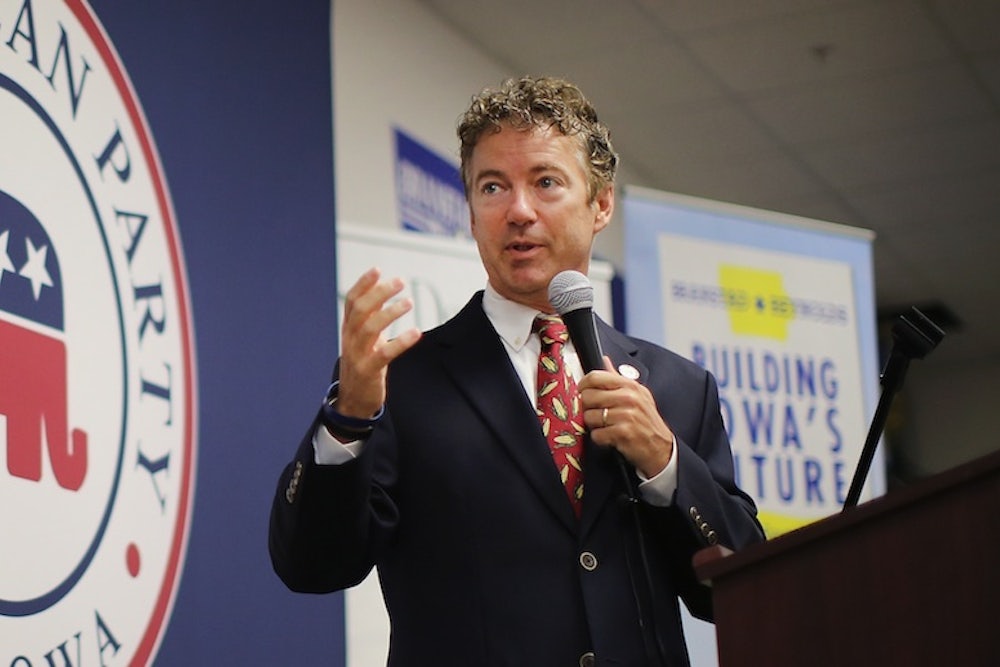The politician who gave the strongest condemnation of police tactics in Ferguson, Missouri, may not have been President Obama or any of the other liberal Democrats you might have expected. It was probably Rand Paul, the Republican senator from Kentucky.
“Americans must never sacrifice their liberty for an illusive and dangerous, or false, security,” Paul wrote in a column for Time. “This has been a cause I have championed for years, and one that is at a near-crisis point in our country.” And Paul didn’t just decry police behavior. He also attacked the criminal justice system—and he attacked it as racist. “Anyone who thinks that race does not still, even if inadvertently, skew the application of criminal justice in this country is just not paying close enough attention. Our prisons are full of black and brown men and women who are serving inappropriately long and harsh sentences for non-violent mistakes in their youth.”
What’s going on here? It’s easy enough to dismiss this as opportunism. Paul has been looking for ways to soften his harsh image, in advance of his 2016 presidential bid. Showing solidarity with minorities is a perfect way to do that. But all politicians are opportunistic. In this case, Paul’s position happens to be consistent with his political worldview. He isn’t just a Republican, after all. He’s a Republican with strong libertarian leanings. He wants to shrink the power of the state. Demilitarizing the police and reducing the severity of federal sentencing laws, a cause he has championed, are two ways of doing that.
And Paul isn’t the only conservative with libertarian leanings who spoke out against police tactics on Thursday. Senator Ted Cruz issued a statement, condemning the harassment of journalists. Conservative writers used social media and columns to make similar arguments. Here, for example, was Mary Katherine Ham, an editor-in-large at the conservative website Hot Air:
We ask more of law enforcement in a free society and we should. We don’t accept that everyone in a community must be under the gun because some of them committed crimes. Or, that journalists should be arrested while trying to cover that community. ... Stipulated that we ask cops to handle challenging, dangerous, delicate situations like riot and looting in Ferguson or manhunts in Boston. Because this is America, we ask them to do it while preserving the rights of innocent bystanders and even those who may be engaging in crime.
Paul and Ham both noted that libertarians have been warning about excessive police tactics for some time now. They have a point. And I know quite a few liberals (starting with yours truly) who didn’t pay enough attention at the time. One reason is the very real, very significant political differences between the two ideologies. The libertarians see overzealous police as symptomatic of overzealous government in general. Demilitarizing the cops, defunding the welfare state—it’s all part of one seamless governing agenda.
But Paul’s comments got some attention from liberals like Congressman John Conyers of Michigan, ranking Democrat on the Judiciary Committee. “I’m encouraged by that kind of observation,” Conyers told Greg Sargent of the Washington Post, adding that he could imagine a liberal-libertarian alliance in favor of sentencing reform and other shared causes. “We hope for it—and every now and then it happens.”
—Jonathan Cohn
The news from yesterday:
FERGUSON: Following nearly universal condemnations of police tactics, including statements from President Obama, Missouri Governor Jay Nixon handed security operations over to the state highway patrol. Nixon said Ferguson had become a “war zone,” called the situation “unacceptable,” and promised a “different tone.” Nixon also appointed Captain Ronald Johnson, an African-American who grew up in the area, to take command of the situation. Johnson began by scaling back the police presence, meeting and marching with the protesters, and vowing that police will respect their right to free assembly and expression. (St. Louis Post-Dispatch, Washington Post, Huffington Post)
WORK AND FAMILY: In response to a Jodi Kantor article spotlighting how automated scheduling systems wreak havoc with the lives of working parents, Starbucks announced that it would revise some of its policies towards employees. Among other things, it will curb the use of “clopening”—having employees close the store at night, then return early in the morning to open it. (New York Times)
IMMIGRATION: With Obama weighing how far he can take executive action on immigration, Manu Raju and Seung Min Kim report that Senate Democrats aren’t pushing the White House too hard. The reason? It could hurt some vulnerable Democrats seeking reelection in deeply conservative states. (Politico)
Things worth reading:
Race and police action: Kim Yi Dionne discusses a study on how police react to different groups of protesters. The study suggests police are more likely to use force when the protesters are African-American. (The Monkey Cage)
Debunking another Obamacare scare story: You may have heard enrollment in the new marketplaces is “plummeting.” Michael Hiltzik and Charles Gaba say it's not. (Los Angeles Times, ACAsignups.net)
Robin Williams, Parkinson’s, and mental health: The comedian’s widow disclosed on Thursday that Williams was in the early stages of Parkinson’s. Tara Culp-Ressler explains the connection between Parkinson’s and depression, and talks about the likelihood that the two together led to his suicide. (ThinkProgress)
Is Obama about to go too far? His critics, and even some supporters, think a sweeping executive order on immigration would violate political norms. Greg Sargent disagrees. (The Plum Line)
Stories we’ll be watching:
If tensions in Ferguson continue to subside, expect the political world’s attention to turn back to immigration.
At QED:
Speaking of immigration, and the president’s planned executive order, Danny Vinik has a big piece on the subject today. Many liberals calling for an ambitious order say Obama can justify it by citing his broad powers of “prosecutorial discretion.” Danny thinks those liberals don’t actually understand what the term means. Also, don’t miss Rebecca Leber’s summary of four steps that police departments can take to avoid the kind of escalation that took place in Ferguson.
